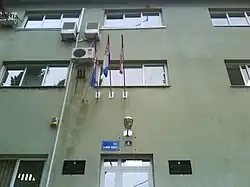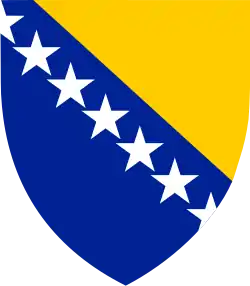Grude
Grude (Cyrillic: Груде, ⓘ) is a town and a municipality located in West Herzegovina Canton of the Federation of Bosnia and Herzegovina, an entity of Bosnia and Herzegovina.
Grude
Груде | |
|---|---|
Town and municipality | |
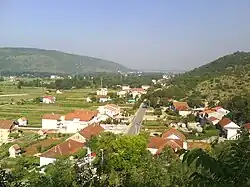 | |
 Flag  Coat of arms | |
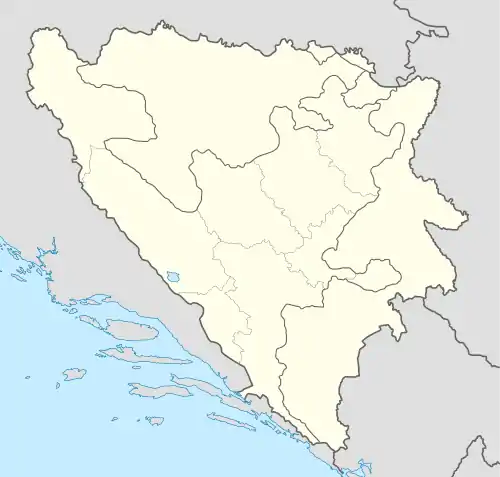 Grude | |
| Coordinates: 43°22′21″N 17°24′51″E | |
| Country | |
| Entity | Federation of Bosnia and Herzegovina |
| Canton | West Herzegovina |
| Geographical region | Herzegovina |
| Government | |
| • Municipal mayor | Ljubo Grizelj (HDZ BiH) |
| Area | |
| • Total | 220.8 km2 (85.3 sq mi) |
| • Land | 220.8 km2 (85.3 sq mi) |
| • Water | 0 km2 (0 sq mi) |
| Population (2013) | |
| • Total | 17,865 |
| • Density | 81/km2 (210/sq mi) |
| Demonym | Gruđani |
| Time zone | UTC+1 (CET) |
| • Summer (DST) | UTC+2 (CEST) |
| Post code | 88340 |
| Area code | +387 (0)39 |
| Patron saint | Saint Kate |
| Website | www |
Geography
Grude is located 49 kilometers[1] from Mostar, 19 kilometers [2] from Imotski, and 100 km [3] from Split.
History
Pre-history and ancient times
Testimony about life in these regions are still present in prehistoric times. In place of Ravlić cave, which is located in Drinovci, were found traces of life dating from the later Neolithic period. The life in these regions has been flowing continuously - the peoples, cultures and civilizations have been changing. In later, but historical times, this soil had very living presence of the Romans, whose commercial road, connecting the two great ancient trading center - Salona and Narona, was passing through the region. Recent archaeological excavations at the site in Gorica confirm that on this soil in ancient times there was a significant Roman settlement. Middle Ages is a time of tombstones - stećak and in municipality of Grude can be found practically everywhere - which proves that at that time was quite a big life. Undoubtedly it is a merit favorable geographical position of this region, as well as the relatively mild climate, together with rich natural resources. Rarely can see where this unusual combination of brutality and tameness of nature that we find in the region of Imotski-Bekija fields - arable land is relatively rich in water in contrast to the fierce and rocky, which is surrounded by.
Middle ages
The end of the Middle Ages was marked by the Ottoman expansion and conquest.
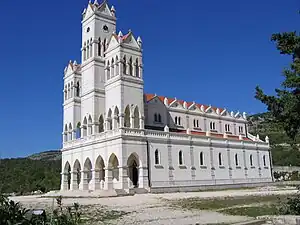
Modern times
After the Turks, Austria-Hungary arrived. This is a short transitional period in which were built numerous schools and infrastructure needed for the functioning of a modern European state, but this is somehow persistently ignored in the overall modernization. Like most of the West Herzegovina cities, Grude was labeled as pro-Ustaše region. Therefore, it has been demonized by the officials of SFRY. The investments were very poor in it. That caused huge poverty and lot of people emigrated to Zagreb and Dalmatia, as well as to Germany as gastarbeiter. Today the municipality is among the most developed in Bosnia-Herzegovina, with numerous medium and small business corporations, Violeta paper factory being the biggest brand. Croatian Republic of Herceg-Bosna and the Croatian Defense Council (HVO) were founded in Grude. The Main HQ of the HVO was located in Grude.
Settlements
Demographics
1971
19,203 total
Economy
During the war in Bosnia and Herzegovina, Grude was one of the bastions of the "rebellion" against the aggression of the Yugoslav Army. The late 1990s and early 2000s were marked by recent war and the struggle for survival, whereas today Grude is experiencing cultural and economic renaissance.
Traffic and road connections
Grude is placed on the crossroads of two big roads: Slavonski Brod-Ploče and Mostar-Split. Through Grude also goes master road M-6 Grude - Ljubuški - Čapljina - Metković. Besides that there are also 3 regional roads:
- R 420 Grude - Privalj - Široki Brijeg - Mostar
- R 421 Sovići - Klobuk
- regional road Grude-Posušje (outside category)
Sports
The town is home to the football club HNK Grude, basketball club HKK Grude, and the female handball club HŽRK Grude. NK Drinovci is based in Drinovci (located in the same municipality). De Boules clubs Grude and Sv. Stipan based in Sovići.
International relations
Notable people
- Milan Bandić, former mayor of Zagreb
- Mate Boban, first president of Herzeg-Bosnia
- Rafael Boban, military commander of Ustaše Militia and Croatian Armed Forces during World War II
- Ljubo Jurčić, former Croatian Minister of Economy
- Goran Marić, former Croatian Minister of State Property
- Mirko Marić, Croatian footballer
- Mile Pešorda, Croatian writer
- Andrijica Šimić, Herzegovinian hajduk
- Antun Branko Šimić, Croatian poet
- Blago Zadro, a commander of the northern part of Croatian forces in Vukovar during the Croatian War of Independence
Communications
Radio Grude broadcasts from the town.
References
- EUR&carbCost=1.3&isAvoidFrontiers=false&isFavoriseAutoroute=false&isAvoidPeage=false&isAvoidVignette=false&isAvoidLNR=false&autoConso=6.8&villeConso=6&routeConso=5.6&dtmDeparture=12%2F3%2F2009&indemnite=0
- EUR&carbCost=1.3&isAvoidFrontiers=false&isFavoriseAutoroute=false&isAvoidPeage=false&isAvoidVignette=false&isAvoidLNR=false&autoConso=6.8&villeConso=6&routeConso=5.6&dtmDeparture=12%2F3%2F2009&indemnite=0
- EUR&carbCost=1.3&isAvoidFrontiers=false&isFavoriseAutoroute=false&isAvoidPeage=false&isAvoidVignette=false&isAvoidLNR=false&autoConso=6.8&villeConso=6&routeConso=5.6&dtmDeparture=12%2F3%2F2009&indemnite=0
- "Archived copy" (PDF). Archived from the original (PDF) on 2013-10-05. Retrieved 2013-03-26.
{{cite web}}: CS1 maint: archived copy as title (link)
